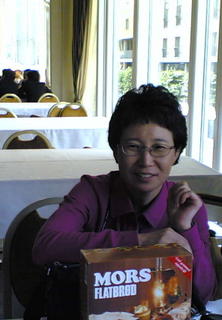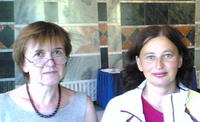Pliny has moved to WordPress
The blog Pliny the Librarian continues at WordPress, where you also find my Norwegian language blog Plinius. Earlier posts from Blogger (21 items) have been copied to WordPress - and indexed for easy retrieval.
A personal blog on books, libraries and other common pursuits
The blog Pliny the Librarian continues at WordPress, where you also find my Norwegian language blog Plinius. Earlier posts from Blogger (21 items) have been copied to WordPress - and indexed for easy retrieval.
Questions about Canada posted on an International Tourism Website. Obviously the answers are jokes, ...
Q:I have never seen it warm on Canadian TV, so how do the plants grow? (UK)
A:We import all plants fully grown and then just sit around and watch them die.
Q:Will I be able to see Polar Bears in the street? (USA)
A:Depends on how much you’ve been drinking.
Q:I want to walk from Vancouver to Toronto - can I follow the Railroad tracks? (Sweden)
A:Sure, it’s only Four thousand miles, take lots of water with you.
Q:Is it safe to run around in the bushes in Canada? (Sweden)
A:So it’s true what they say about Swedes.
Q:Are there any ATM’s (cash machines) in Canada? Can you send me a list of them in Toronto, Vancouver, Edmonton and Halifax? (UK)
A:What did your last slave die of?
Q:Can you give me some information about hippo racing in Canada? (USA)
A: A-fri-ca is the big triangle shaped continent south of Europe. Ca-na-da is that big country to your North…oh forget it. Sure,
the hippo racing is every Tuesday night in Calgary. Come naked.
Q:Which direction is North in Canada? (USA)
A:Face south and then turn 180 degrees. Contact us when you get here and we’ll send the rest of the directions.
Q:Can I bring cutlery into Canada? (UK)
A:Why? Just use your fingers like we do.
Q:Can you send me the Vienna Boys’ Choir schedule? (USA)
A:Aus-tri-a is that quaint little country bordering Ger-man-y, which is…oh forget it. Sure, the Vienna Boys Choir plays every
Tuesday night in Vancouver and in Calgary, straight after the hippo races. Come naked.
Q:Are there supermarkets in Toronto and is milk available all year round? (Germany)
A:No, we are a peaceful civilization of Vegans. Milk is illegal.
Q:Will I be able to speak English most places I go? (USA)
A:Yes, but you will have to learn it first.
Early in December I go with my mother - a retired librarian - for a pre-Christmas vacation in Cyprus. The Norwegian winter is very bracing. Several municipalities are now sponsoring rest and recreation visits in the Mediterranean for retired (or disabled) people who would rather stay warm. We join one of these groups.
Men who read are more attractive, I said yesterday. But they should not visibly read Harry Potter or similar stuff.
Today I found a list of top "geek novels" compiled by Jack Schofield, journalist and Guardian blogger, on the basis of reader recommendations. My source: Lorcan Dempsey' s great blog on library innovation:
The top fifteen were
1. The HitchHiker's Guide to the Galaxy -- Douglas Adams 85% (102)
2. Nineteen Eighty-Four -- George Orwell 79% (92)
3. Brave New World -- Aldous Huxley 69% (77)
4. Do Androids Dream of Electric Sheep? -- Philip Dick 64% (67)
5. Neuromancer -- William Gibson 59% (66)
6. Dune -- Frank Herbert 53% (54)
7. I, Robot -- Isaac Asimov 52% (54)
8. Foundation -- Isaac Asimov 47% (47)
9. The Colour of Magic -- Terry Pratchett 46% (46)
10. Microserfs -- Douglas Coupland 43% (44)
11. Snow Crash -- Neal Stephenson 37% (37)
12. Watchmen -- Alan Moore & Dave Gibbons 38% (37)
13. Cryptonomicon -- Neal Stephenson 36% (36)
14. Consider Phlebas -- Iain M Banks 34% (35)
15. Stranger in a Strange Land -- Robert Heinlein 33% (33)
I must admit that I have read all of them - except Pratchett (too cute) and Banks (very British SF). And all of Harry Potter as well. No hope, then.
Men who read stand a better chance of attracting women according to a study. Women claim they are more likely to be seduced by a well-read man.
85% of women questioned in a NOP survey for the publisher Penguin said they would be more attracted to a man who talked about literature. But women would be inclined to judge men by the type of books they read. On this rating, reading Harry Potter scored very badly.
(The Times, 7 June 2004)
I knew it! Casanova, of course, became a librarian in Bohemia - at the age of sixty. Pity about Potter though. What type of books should we read?
The king was dressed in a simple business suit
and looked like a typical business man.
The great event is past. IFLA has visited Oslo. The circus came from Buenos Aires - and moves on to Seoul, Durban and Quebec. It is time to reflect. What does IFLA "mean"?
 As a sociologist, I am curious about IFLA as an institution. The IFLA conferences are important evenyts in the world of librarianship. IFLA itself is deeply committed to a global view of library services.
As a sociologist, I am curious about IFLA as an institution. The IFLA conferences are important evenyts in the world of librarianship. IFLA itself is deeply committed to a global view of library services.
Since libraries must borrow from each other, the library community is necessarily a networked community. IFLA supports all basic human values. It works closely with UNESCO - and gives librarians an arena where they can combine technical collaboration with concrete efforts to build a decent world.
IFLA is also a complex organization. The organizational structure has grown from within, into a thorny thicket of bodies and responsiilities. From the outside it is hard to understand and hard to penetrate.
Commercial firms are streamlined by the market. Public institutions are supervised by cost-cutting governments. Voluntary organizations must modernize themselves.
IFLA has definitely started the process. But it has a long road ahead. The world outside is moving towards flexible, networked, spirited ways of communicating. To remain relevant and fresh, libraries and library organizations must do the same.
For this, blogging is a most appropriate tool.
IN ENGLISH
IN NORWEGIAN AND OTHER WORLD LANGUAGES
The inside dope
In civilized social life, we always operate at two levels: the outer and the inner, appearance and the "real works". The sociologist Goffman speaks about front-stage and back-stage. To understand people, organizations and societies we must learn to see beyond the surface.
That does not mean discounting the surface. Appearances are real, significant and worthy of attention. The formal speeches on the lighted scene and the informal negotiations in the "smoke-filled back-room" are both components of political decision making.
We understand society when we understand the interplay between front and back, light and shadow. Formal institutions and informal networks are both parts of the Great Game.
Formal structures and processes are surrounded by a constant flow of informality: talk and whispers, gossip and chatter, jokes and outbursts, stories and interpretations. The moralist sees empty talk. The anthropologist sees community at work.
We constantly test and transmit the things we see and hear. This is a necessary process. Great events must be taken in and digested. Communities depend on gossip like individuals depend on dreams.
The blog medium - like letters and diaries - spans the gap between formal and informal social life. The blog, however, is inherently public. Diaries and letters stay within the private sphere unless they are deliberately released to the general public.
Googles blog index, at http://blogsearch.google.com/, allows us to access the world of blogs. Blogs have always been indexed by Big Mama Google. But a search tool that only covers the blogosphere makes such searches more convenient. We can, more easily than before, catch the personal, informal and spontaneous response of people to events.

 The composition of the meeting
The composition of the meetingThree national journals
What's the buzz?
With Frida available, such a survey can be made in a few hours. Note that the list is incomplete. Many publications from 2005 have probably not been registered yet. But tracing additional publications to fill in the holes could easily take a full working week.
I publish the list as it stands. It works as a rough snapshot of current research. Eighty percent of a sausage is better than none.